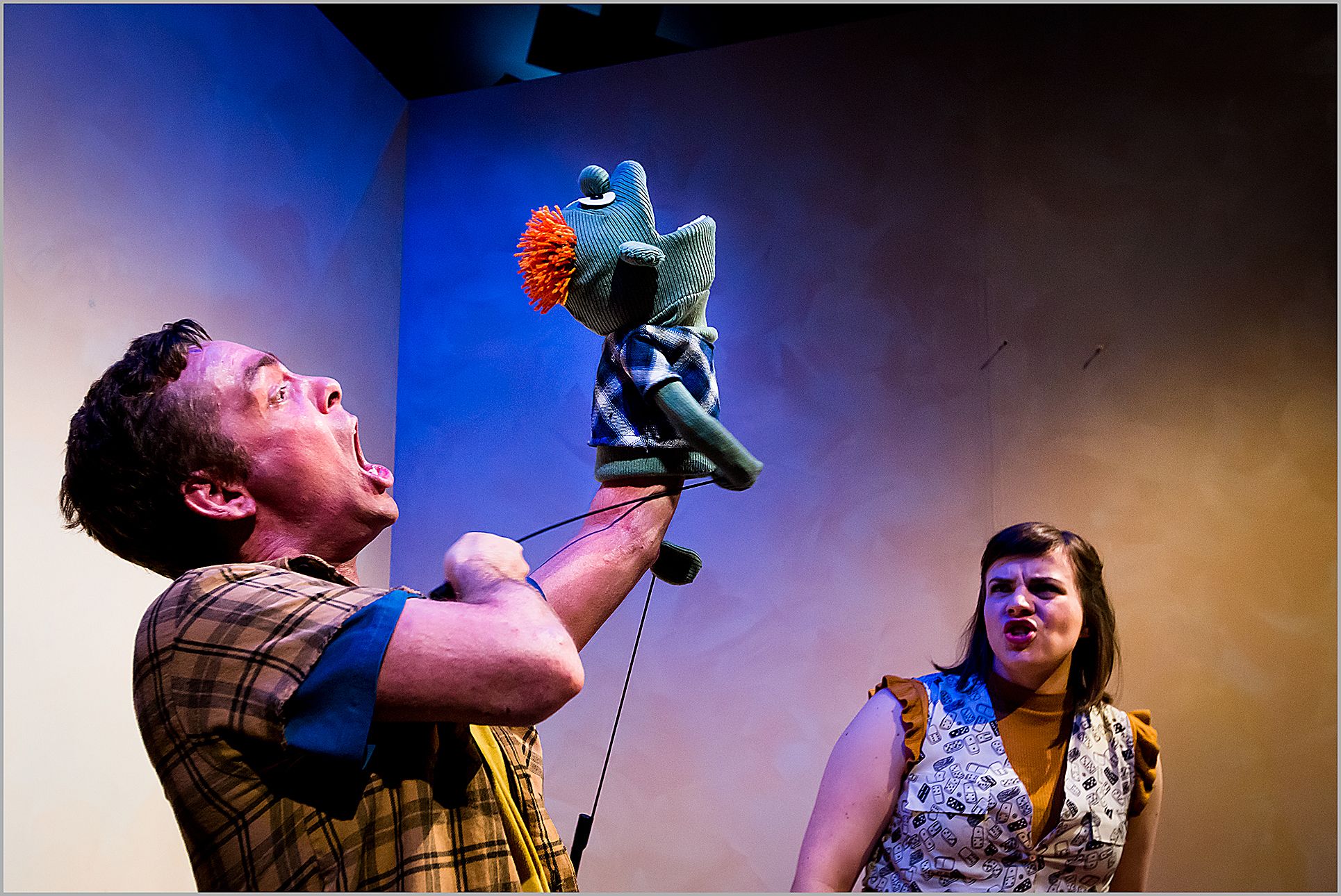This Puppet's My Shepherd: A Review of Hand To God
Matthew Loveranes reviews Circa Theatre's season of Hand To God, a rip-roaring comedy about a violent, profane puppet that also has a lot to say about the road to salvation.
Matthew Loveranes reviews Circa Theatre's season of Hand To God , a rip-roaring comedy about a violent, profane puppet that also has a lot to say about the road to salvation.
In the beginning, there were puppets.
They helped you count, spell and treat people with respect. Whether you devoured every Muppet movie on VHS or snuggled up to your Cookie Monster plushie (so much better than Tickle Me Elmo), puppets were innocent, teaching us how to be good at a time when we were just starting to learn about evil. So when the Kermit-green puppet Tyrone emerges from the darkness in Robert Askins’ Hand to God, sounding more like a school shooter than a Sesame Street character, it’s pretty clear this won’t be like the early morning TV you watched with Mum. Tyrone raves about the “evil bastard” who invented the devil, that when the evil bastard was caught in sin he dodged responsibility and replied, “The Devil Made Me Do It”. Tyrone’s not all that kid-friendly, but he’s still trying to teach us a lesson.
Then we’re thrown to a church basement in Texas where recently-widowed Margery (Amy Tarleton) is struggling to keep her puppet-making class together. A big back-lit cross looms over the room and “Praise Him” posters cover the bright, baby blue walls, but the rhetoric being thrown about inside is hardly Christian. Scrappy Timothy (Jack Buchanan) lobs cuss-heavy slurs across the room at his classmates; Jessica (Hannah Banks), smarter and quicker, flings them back with ease. Margery’s shy son Jason (Tom Clarke) is less successful. Jason’s a sad, sickly-looking boy who can barely get a word in edgewise. It’s on his hand that Tyrone is snugly perched.
In addition to harbouring a pretty serious crush on Jessica, Jason is also mourning his father’s death six months ago. It’s a lot to deal with, and it’s Tyrone who helps him cope. When Jason struggles to articulate how he feels, Tyrone takes on a life of his own. He’s Triumph the Insult Comic Dog on acid, a grotesque embodiment of Jason’s id, chewing up and spitting out everyone in his way by shouting Jason’s every perverse thought out loud.
The beautiful thing about Hand to God, though, is that no matter how ugly or messy these characters get, no matter how they sin or how much they sin, they’re not malicious.
Tyrone also chafes at the social conventions of this small Texas town. Everyone’s social standing in this town is oppressively defined by whether they’re a ‘good Christian’, to the point that Margery and church leader Pastor Greg (Peter Hambleton) qualify everything they do by the need to be seen as devout. This ‘piety’, a patch over everyone’s messiness, is reflected in the production design. Ian Harman’s colourful set should be a welcoming space, but instead it’s a sickly-sweet stained glass Lisa Frank rainbow hellscape; Tyrone, designed by puppeteer Jon Coddington, looks like a wholesome Jim Henson creation but he’s hiding some fangs, literally. When Tyrone bares his teeth, he turns into a horror movie nightmare. The truth will always out, even when it’s ugly.
Jason, via Tyrone, and Timothy are only able to crack through the bullshit and get that truth out by expressing themselves in the basest, most demeaning language. This ‘radical truthfulness’ is a charade of its own, though, a superficial rebellion where the loudest and most controversial voice in the room seizes the power. Dishonesty is answered with dishonesty, vulnerability is rejected and painful emotions like grief are incapable of being expressed and understood in healthy ways – so it’s no surprise that Tyrone soon starts hurting people, physically and emotionally, and that everyone else starts to see his behaviour not as a cry for help from a troubled boy, but as the work of the devil.
The beautiful thing about Hand to God, though, is that no matter how ugly or messy these characters get, no matter how they sin or how much they sin, they’re not malicious. Instead, they’re motivated by pain, or by cheap, easy comfort. They’re mortal and they’re fallible; these rednecks and bible thumpers aren’t caricatures of ignorance and intolerance. They’re human beings.
Tarleton is a natural at showing this inner struggle. Like her son, Margery’s haunted by her husband’s death, but both are blind to the other’s grief. She’s struggling to avoid advances from both the good Pastor Greg, whose come-ons are pathetically transparent, and from Timothy. She reproaches Timothy, stiff and resolute, but she’s stirred by how bold and forthright he is; her eyes and voice betray her. Needing an outlet and unable to open up to her son, her pain and frustration turn into self-destruction and she finally succumbs, transforming into a dominatrix. With every slap and aggressive command, she sheds the armour of her rigid Christian morality and embraces a freedom that’s been missing for a long time. In contrast, when Timothy, whose alcoholic mother has been a largely absent presence in his life, excitably complies, it’s hard not to see a boy seeking a mother figure’s approval. The situation is so wrong but oddly perfect, and Askins shrewdly exploits the comedy in this moral grey by pushing it to the ridiculous: when they fuck, they desecrate every inch of that stage, breaking desks and smashing sinks. It’s so over the top that it loses all sense of salaciousness.
In his dual roles as Jason and Tyrone, Clarke is explosive. Tyrone commands attention, his raspy smoker’s voice a jolt of energy that tears through the sea of lethargic Southern drawls. He’s in-yer-face and unpredictable; when he opens his mouth you might expect a vicious, verbal attack but you could just as easily get a hypersexual cover of Justin Bieber’s “Sorry”. Conversely, his Jason is introverted and unsure: his back’s never straight, his manner, clumsy. Beneath his feeble façade, though, lies a dormant volcano, ready to explode with the right provocation. It’s a hell of a showcase, mastering these two distinct personas and switching between them with alacrity and precision, and Clarke gives himself up to the material. Clarke’s most impressive when he’s negotiating the shifting power dynamics between man and puppet. When Tyrone’s in control, Jason’s a slingshot, flinging his body to follow his lead. When Tyrone is gone and Jason’s free to feel and express his raw, unadulterated grief, his wails cut bone-deep. It completely bowls me over.
When Askins dishes out punishment, he doesn’t just go old school – he goes Old Testament, serving up brutal retribution for mother and son, a hand for a hand.
The only person in this thing who can see Jason’s pain is also the only person who’s not trapped in any pretence: Jessica. Jessica constructs a puppet of her own to distract Tyrone, cuing up two scenes that take place simultaneously. The first, a hilariously graphic and uncomfortable fuckfest with the puppets; the second, an honest and emotional heart-to-heart between Jason and Jessica. The dual scenes play out awkwardly, beautifully, and totally organically, driven by Banks’ unwavering commitment to this perverse puppeteering and by her steady, compassionate engagement with Jason. She dares Jason to own both his sexual and emotional baggage with total conviction. By the time she says “I’ll see you at Homecoming”, it’s so tender (and corny) that it almost makes you forget all the abuse she’s endured.
But parables dictate that every bad deed get their comeuppance. In that regard, Hand to God is no different. Both Jason and Margery still have their demons. Margery tries to cast her demons out through Timothy; Jason still channels it all through Tyrone. So when Askins dishes out punishment, he doesn’t just go old school – he goes Old Testament, serving up brutal retribution for mother and son, a hand for a hand. It’s only after this poetic justice that they are able to be emotionally naked with one another: no pretences, no more demons.
In Luke 13, Jesus teaches that we must “Make every effort to enter through the narrow door, because many, I tell you, will try to enter and will not be able to.” The narrow door is reserved not for the likes of Pastor Greg, whose “good” facade (which Peter Hambleton builds with a pleasant cadence and gentlemanly demeanour) cannot mask his sleaziness, but for those who recognise their demons and allow themselves to be open to change and forgiveness. Jason and Margery have sinned, paid for it and seen the light, earning a path to salvation. The reconciliation is sweet and uplifting but glosses over all the hurt they’ve caused other people – it’s a neat, guilt-free Hollywood ending.
Thankfully, Tyrone gets the last say and cuts through the bullshit once again, using his parting words to admonish how messy and fickle humans can be. It’s a more cynical, and more satisfying, ending. Jason and Margery can enjoy their moment of hope and renewed openness, but Askins shrewdly reminds us that demons don’t go away that easily. The harder task, facing the lingering repercussions of their actions, is yet to come.
Hand to God revels in the ridiculous, constantly referencing pop culture and wholeheartedly embracing its sexy, gory, profane transgressions. Director Lyndee-Jane Rutherford delivers a rip-roaring, balls-to-the-wall production that ticks all the boxes for a genre nut like me. Most of all, though, Rutherford and Askins deliver a production that passionately and persuasively makes the case that the counterpoint to evil is not necessarily being good – but, instead, being human.
Hand To God runs at
Circa Theatre, Wellington
from Saturday 22 April to Saturday 20 May
For more information about Hand To God, go here.

